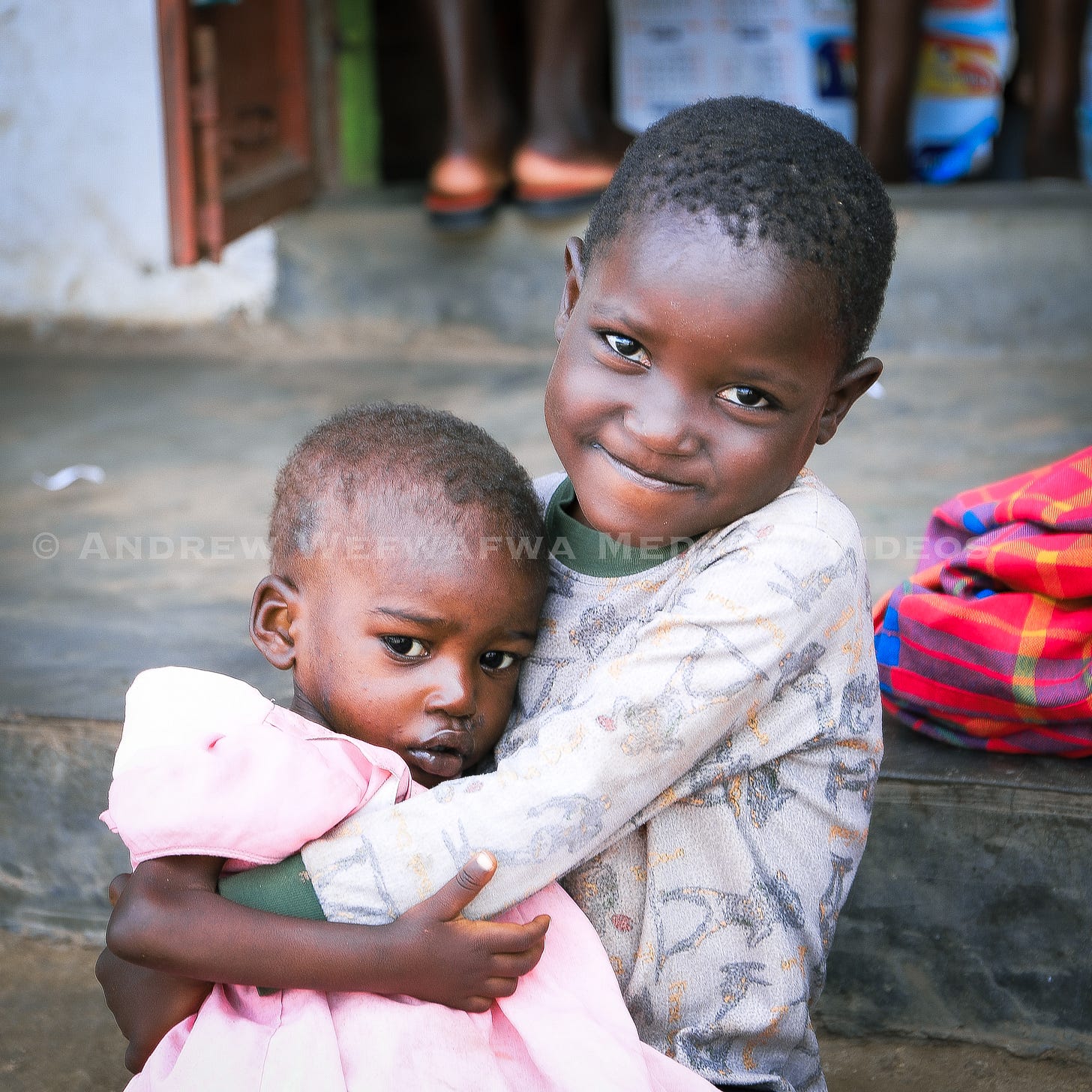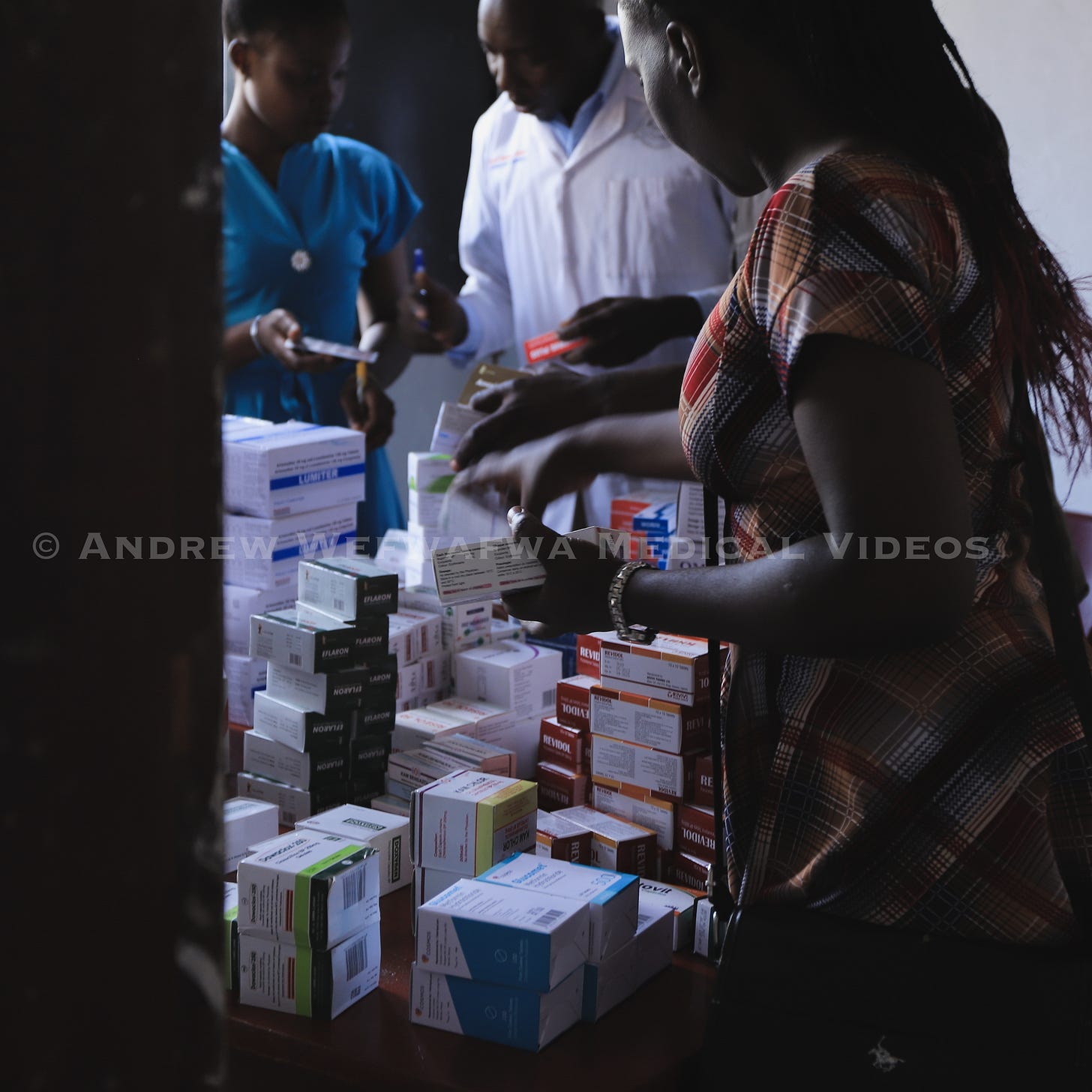Understanding Ecological Technology Models in Uganda
Ecology, cultural sensitivity, free medical-camp & more!
Hello there,
Have you scratched your head yet and wondered, ‘Why is this dude’s newsletter called The Liger?’ The answer is simple: My mom named it. Okay, I’m half-kidding—kinda like a liger is half-lion and half-tiger. I’ll let you guess which half is lion to you. The truth is this newsletter is a delicate and culturally sensitive blend of two perspectives: The rich dynamic first-hand experience of a clinician in Uganda and the curation of his work into a presentable and digestible newsletter worthy of reading. The concept of a liger seems to blend these two perspectives together into something awesome. Besides, who doesn’t want to read a newsletter called The Liger?
Here’s the Agenda:
Wefwafwa’s patient and a note on photos.
This newsletter’s cultural bridge.
Tons of maize flour delivered to Wefwafwa’s community.
Free medical camp treats 300 people.
Wefwafwa’s Work in the Community
Summary
We're working on sharing more health stories from Uganda, but we need to sort out some logistical stuff first to protect everyone's privacy. Stay tuned! However, we can start sharing photos of the children who are Wefwafwa’s patients. Just a heads-up, all our photos and videos of kids are taken with explicit parental consent and in their presence, and we can remove content at any time if asked.
Patients and projects are being managed regularly by Wefwafwa Andrew and his team. His Buwanga Way to Health Foundation is a Ugandan Government recognized and approved NGO. Check out Wefwafwa Andrew Medical Videos for more information, or feel free to directly contact Wefwafwa Andrew:
Whatsapp + 256 726 448909
Email wefandrew@gmail.com
Cultural Sensitivity, not Western Hegemony
Why is there a newsletter?
The answer lies in the story behind how a simple outreach initiative turned into an opportunity to develop a genuine, cross-cultural connection. Earlier this year, Wefwafwa and I planned a fundraising and awareness event for World Malaria Day. The event was successful with the help of a great team of students and a ton of planning. Wefwafwa purchased his community’s first microscope. After the event, we discussed ways I could continue to support his work and vision. He brought up the idea of a newsletter and explained that writing to a western audience is difficult. This moment was critical in recognizing an opportunity to support his vision.
Global outreach is culturally sensitive for Westerners because the Western worldview often does not accurately represent the complexities of other cultures. Assumptions are typically laden with mistakes and misunderstandings. These unexamined assumptions often lead to biases that shape our attitudes. Western science often assumes that its way is the 'best' or 'only' way, especially when it comes to helping other countries.
Cultural sensitivity, not western scientific hegemony, is the key to supporting the vision of people instead of implementing one’s own. This newsletter supports Wefwafwa’s vision to reach a larger audience and gain a footing on a new platform. It required cultural sensitivity to recognize his request, and support him by running it weekly. By listening to Wefwafwa and his community's needs, we're not just offering aid; we're supporting their own vision for improvement and empowerment.
The liger serves as a bridge between two cultures. It is based on mutual respect, understanding, and empowerment for one another as we move forward together.
Maize & Technology Models
Introduction
When you think about information, you are playing with ideas and forming new connections. We use this information to make sense of the world around us. Thinking is a powerful tool. When we acquire new information, it helps us build a more accurate model of the world we live in. This enhanced world conception helps us communicate ideas and understand complex issues. When we focus on attaining new information and begin caring about people and cultures in other parts of the world, we communicate these ideas more accurately. This process of information acquisition followed by practical practice builds a mental schema that helps us see health disparities more clearly. Ignoring information and staying complacent with our world conception is myopic. Information empowers us to overcome implicit bias. It empowers people to confront misconceptions and fallacies. It empowers communities to start initiatives. Empowerment is the embodiment of a mind that understands information readily and clearly.
In Uganda, food security is a yearlong issue. In the western world, putting food on the table is symbolic for going to work and providing the family unit with a meal, or three, everyday. In Uganda, there is a significant ecological component that goes into providing local sustainability for their food sources. Corporations in the United States grow and source food to seal and display in air conditioned grocery stores for those with the buying power. In some districts of Uganda, food is sourced by local farms run by local farmers and mill workers. If these local farms and mills aren’t hiring, men with families living in the countryside will take work in the cities. For young married men living away from their wives for 6 months at a time, there could be obvious implications. Community-wide famine and malnutrition in rural communities are not uncommon. These health disparities affect people directly. Young malnourished children become increasingly susceptible to the worst-case outcomes of disease. This information is critical to understanding more about the variable factors contributing to the health disparities affecting people in Uganda.
Importance of Maize Flour
Empowering local sustainability starts with recognizing the entire conceptual landscape instead of zeroing in on providing people relief. Addressing food security in Uganda is a complex and culturally sensitive issue that requires more effort than aid can provide. Recognizing the necessity for communities to establish local sustainability efforts and considering the pertinent ecological components like the importance of maize helps strengthen local agriculture and empower communities in Uganda. Maize is a staple crop in Uganda, and it can be milled by local mill workers to turn into flour which is used by families to make food. Bean plants are another staple crop that help enhance the soil quality during crop rotations. Together they serve multiple ecological components. Intercropping is a process of maximizing available space to enhance crop yields. The maize plants have taller stalks that the bean plants use as a scaffold to climb and grow. It offers twice the yield for the same space, opposed to growing two maize plants that compete for real estate. Beans are also legumes. Leguminous plants are keystones for sustainable agriculture. The legumes fix nitrogen from the atmosphere into the soil, a process called nitrogen fixation. Crop rotation occurs every few years. Legumes like the beans are plowed back into the soil to fixate nitrogen back into the soil. This rotation improves the nitrogen content and naturally enhances the quality of the soil.
Utilizing an approach that focuses on local agricultural techniques of farming and milling helps reinforce the empowerment of a community. Rather than providing them aid which stifles self-sustainability. The emphasis on meeting people where they are, working with them where they are, and moving forward together is an appropriate technological model. It doesn’t assume people are incapable of doing it for themselves, but empowers them to make the most of what is available and feasible.
Systems that work in the United States or other western countries are not sustainable or feasible for the needs of communities in Uganda. Instead, employing local people like farmers and mill workers to stay in the countryside and tend to local agricultural systems is more sustainable than implementing an entirely new western system. Ecologically, food security depends on the supply and demand of maize flour and its fluctuating prices throughout the year. Maize flour is affordable for people living on less than a $1 a day. Maize is harvested and sold to mills in the months of late August and early September. Wefwafwa Andrew is a clinical medical officer working out of Mbale, he also serves as a local expert on the ecological topics of nutrition and food security. According to Wefwafwa, price fluctuations for maize flour are correlated with the decreasing supply and increasing demand from this community. After a few months, the decreased supply causes the prices to soar nearly 40 to 50%. These price increases make maize flour unaffordable. Malnutrition ripples throughout the community.
Empowerment Not Aid
Synergizing selective external expertise with local culture and appropriate technology models helps fuel an economy into providing long-lasting and affordable prices to more people. Wefwafwa’s vision for his community is providing the means to establish and support a healthy community. Food security plays directly into the health of this community. Utilizing an appropriate technology model to empower Wefwafwa’s vision was recently completed by Dr. John Campbell. Maize in the excess of 20 tons and high protein beans, arrived at Wefwafwa’s officially registered Buwanga Way to Health Foundation community center. Recognized and registered with the Ugandan Government, their local mill has a food hygiene certificate, and it is held to the highest professional standards.
The increase in supply helps alleviate prices for longer, making maize flour more affordable for a longer duration throughout the year. This accomplishment met with all the necessary legal requirements adhering to all local regulation with the Ugandan Government. The process is fulfilled by locals who deliver, unload, mill, and sell the flour at reasonable prices that are just enough to cover the total amount of the contribution. The flour is sold locally with no net profit and stays within the confines of the local community. Additionally, the sales are supporting the costs needed to feed an orphanage of around 100 children in the Manafwa District year-round. Promoting independence by preventing external dependency and offering the opportunity to utilize appropriate technology models that empowers communities—providing empowerment, not aid.
Medical Camp Treats 300 Individuals
Summary
Last Friday, Wefwafwa conducted a free one-day medical camp which treated 300+ patients with the support from patrons from around the world. This camp served to support his vision of a healthy community, which employed local professionals to provide screening, testing, and treatment for hundreds in the Manafwa District. The Buwanga Way to Health Foundation holds these camps to provide blanket healthcare to large populations who otherwise have difficulty accessing or paying for affordable healthcare services and medication.
Working where people are includes taking healthcare to communities that need it first. If someone needs specialized healthcare services, they are brought to a hospital or trained specialist. Transporting multiple patients to several hospitals is difficult to maintain. So, it is important to set up these camps to serve large groups of people at once. For example, tooth extractions are uncommon and expensive. The camp offered this service for free. All staff and medical professionals employed were local. They tested people for sexually transmitted diseases (STDs), urinary tract infections (UTIs), and Malaria among other diseases. All testing, screening, and medications were free too.
Thank you for reading!
That’s all the juicy content for this week, hope to see you again for next week’s newsletter and update from Wefwafwa! 🇺🇬








I like this. Asking someone what help they need instead of giving what help we think they need. Both come from good people with great intentions. Yet, one method may help them thrive as an individual better while the other method might, accidentally, cause more distress. Thanks for sharing.
Hi Rex I’ve just learned about your Substack from Dr. John Campbell I think it’s fantastic that we have younger blood in on this conversation to give hope to the next generation going forward
And yes we need to have these dialogues looking forward to future articles and again fantastic that you’re involved and wish you well on your future posts 👍